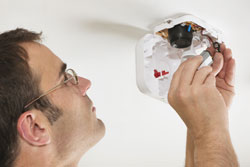 Fire safety in your home involves a lot more than putting up a few smoke detectors. To keep your family safe, fire-prevention experts recommend you take time to go through a checklist of precautions and have in place a detailed escape plan.
Fire safety in your home involves a lot more than putting up a few smoke detectors. To keep your family safe, fire-prevention experts recommend you take time to go through a checklist of precautions and have in place a detailed escape plan.
“People often don’t realize how quickly home fires spread,” said Heather Trnka, injury prevention coalition coordinator at Akron Children’s. “And often people are not prepared.”
“Fires can double in size in 30 seconds,” she said. “If you bury your fire extinguisher in a kitchen cabinet or bury it in a closet, you lose critical time. They need to be hung.”
Heather is also director of Safe Kids Ohio. The organization, the National Fire Protection Association and other experts offer these tips:
- Unattended cooking and candles are responsible for many house fires. If you think a candle in a jar is safe, you’re mistaken. The glass can expand and explode, Heather said. You shouldn’t use a candle in a jar for more than an hour, and never leave it unattended.
- Have smoke alarms in every bedroom and on every level. Dual-sensor smoke alarms – with photoelectric and ionization sensors – are best.
 Replace smoke alarms at 10 years or if they don’t sound when tested. Replace batteries yearly. Test alarms monthly.
Replace smoke alarms at 10 years or if they don’t sound when tested. Replace batteries yearly. Test alarms monthly.
- An interconnected alarm system is best – if one alarm sounds they all sound.
- Have 2 ways out of every room. Rooms on the second floor should have escape ladders located close to a window.
“Teach kids how to open the window, push up a screen, open up the ladder and toss it out the window,” Heather said. “You don’t want a child to use it for the first time in a panic situation.”
- Do fire drills twice a year.
- In your escape plan, establish an outside meeting spot. It should be near your house on the same side of the street.
- Get out of the house before you call 911. Don’t go back inside, not even for pets.
- Replace fire extinguishers every 5 to 15 years, depending on the manufacturer.
- Have your chimney cleaned by a licensed chimney sweep once a year.
- Don’t burn paper or other scrap in your fireplace. Burn seasoned wood. Duraflame logs are okay, too, but be careful not to stoke the fire because it may grow too large too quickly.
- Use a fireplace screen and keep glass fireplace doors open when a fire is burning. Glass doors can get extremely hot and pose a burn hazard. Make sure the fire is completely out before going to bed.
- Keep space heaters and other heating equipment away from anything that can burn. Space heaters account for about 40% of home heating fires. Send in registration cards for space heaters, so you are aware of any recalls.










